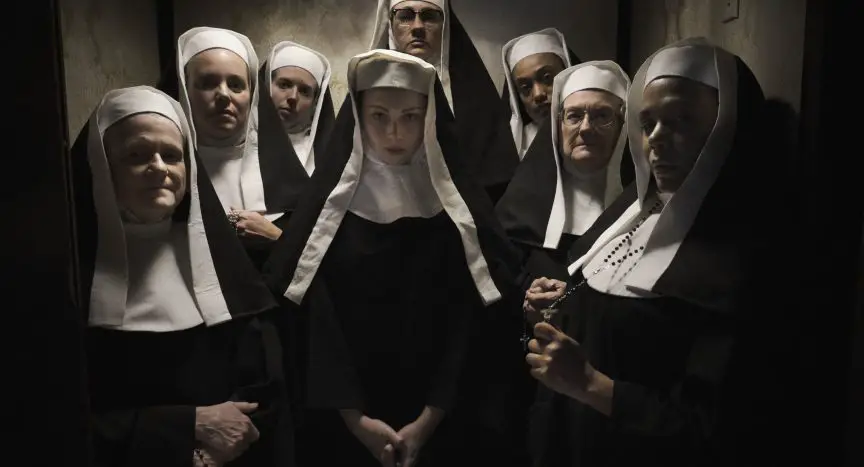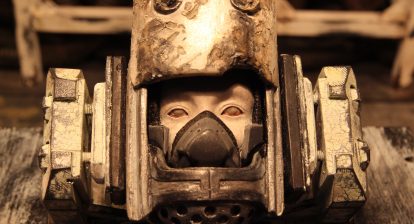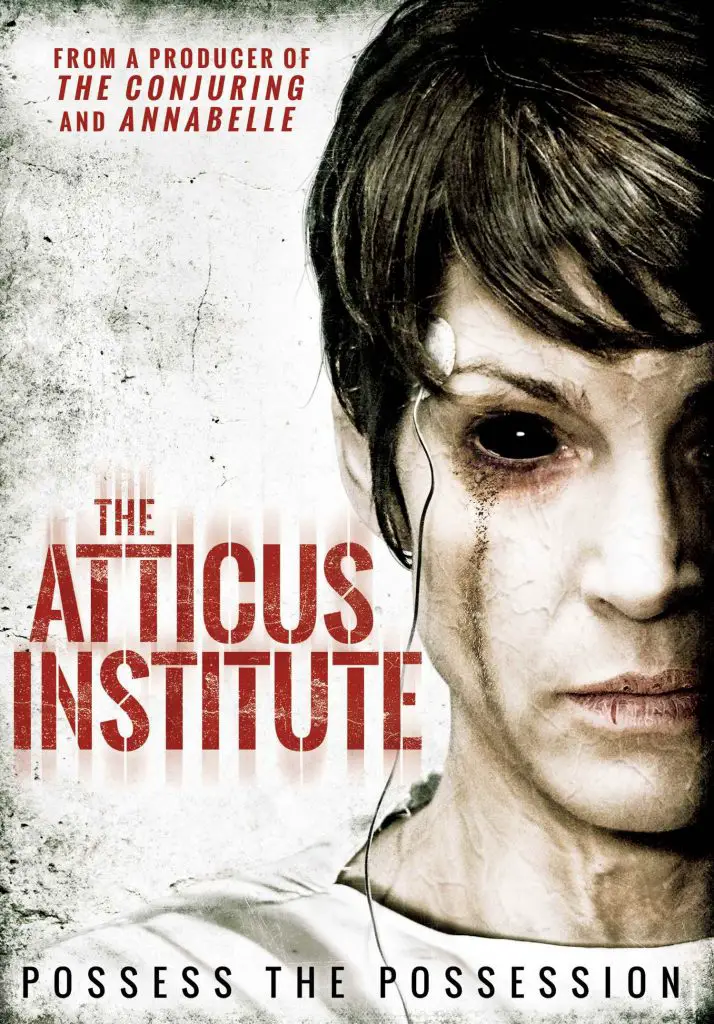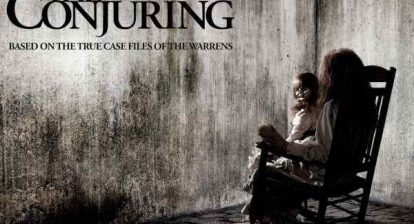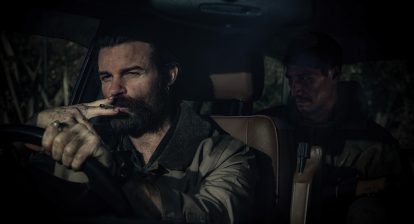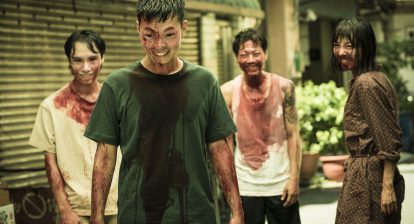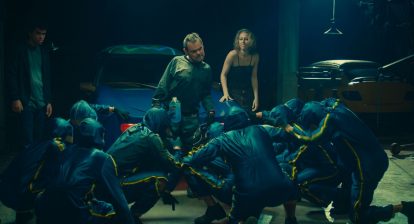Agnes, the latest film from prolific cult film writer/director Mickey Reece, opens on some very familiar territory. The titular Agnes (Hayley McFarland) is a young nun in a remote convent. Formerly the picture of piety, she has become prone to violent rages and profane outbursts, buffered with dark secrets she shouldn’t know about the people around her. Concerned they may be dealing with a genuine case of demonic possession, the Mother Superior (Reece regular Mary Buss) contacts her superiors for specialized spiritual aid.
The calvary takes the form of the gruff Father Donaghue (Ben Hall). A lifelong priest and specialist in exorcism, he’s a grizzled veteran who has long given up the shining armor of Biblical literalism, calling his own specialty a bit of left over “Medieval woo woo”, with exorcism acting only as a placebo for the power of the victim’s own faith in a higher power.
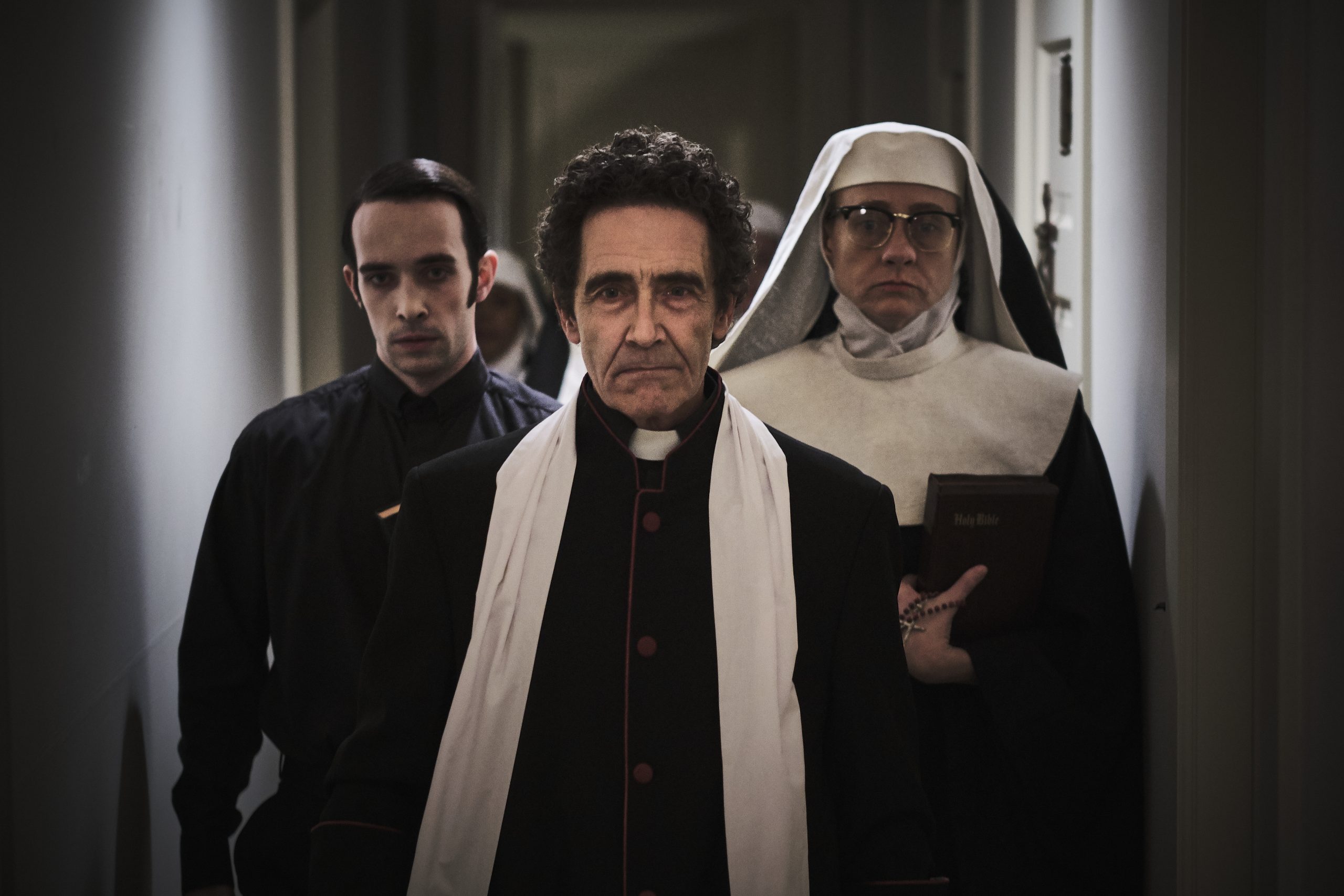
Neither his embrace of more secularly styled ideas, nor the existence of sexual abuse allegations have endeared Father Donaghue to his superiors. Along for the ride is a soon to be ordained student, Benjamin (Jake Horowitz). The fresh faced neophyte is basically a perfect seminary teacher’s pet, and is obviously sent along to keep a watchful eye on Father Donaghue, with a by the book approach and a less cynical eye toward their assigned task.
Reece’s signature style tends toward the conversational and claustrophobic, and the isolated environs of the cloister are an excellent match for that mode. There’s plenty of his stylistic hallmarks here, from a tendency toward slow motion and leisurely stills to add visual heft between dialog heavy scenes, to a moody use of shadow that heightens the cramped feel of a limited space. Agnes’ possession is revealed over a 70s Betty Crocker style monstrosity of a birthday cake, recalling the lovingly photographed dinner party disasters of his previous festival hit, Climate Of The Hunter.
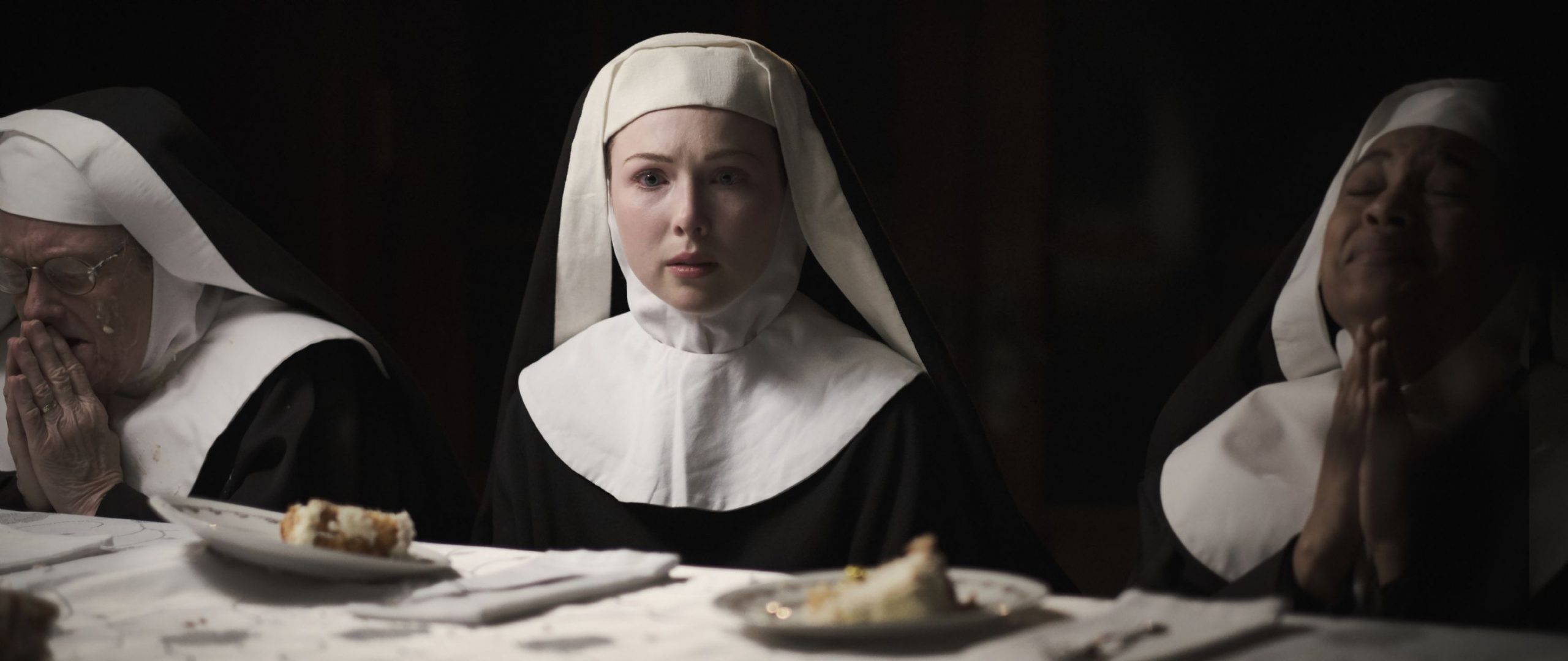
There’s also a deep knowledge and affection for the religious genre narratives that have come before, with referential nods to both the obvious (The Exorcist) and the decidedly more obscure (Black Narcissus, Agnes Of God). What is less expected is how well the eerie setting melds with a dry undertone of dark humor. Mary Buss’ Mother Superior is basically a prison warden in a habit, who reacts to having to celebrate a birthday like it’s a diagnosis of a terminal disease. The sisters of the order are a grab bag of familiar nunsploitation tropes, from the barely cloaked lust of Sister Honey (Zandy Hartig), to the cynical smirk of Sister Ruth (a woefully under utilized Rachel True, who does a fine job of finding moments to steal in a severely underwritten role).
The Mother Superior is clearly displeased with Bishop sanctioned wolves in her orderly henhouse, let alone a disgrace to the Church and an unordained young man who might be a bit too much of a temptation to the nuns in her care. A potential possession is terrible, but proximity to the potential sin is worse. Ben Hall pushes the considerable charisma he’s displayed in his previous roles in a more world weary direction. His character is an expert in speaking what he believes to be a theologically dead language, but Hall’s performance still manages to make credible Mother Superior’s notion of Father Donaghue as enough of a threat to taint both the nuns of the order and his far ideologically purer companion.
Also See: The True Story Behind The Exorcism of Emily Rose
Unsurprisingly, tossing a man clearly having a crisis of faith into the midst of a literal crisis is unsuccessful in treating Agnes’ torment, be it demonic or psychological. Instead the heavy lifting is forcibly outsourced to an excommunicated associate. Henry Black is a defrocked priest in the full Billy Graham televangelist tradition, with a shiny sports car and a bouffanted chain smoking assistant that looks like she wandered in off the set of a 60s sexploitation film. There’s some clever critique in all of this melodrama, the chaotic proceedings illustrating the wide gulf between the larger business of organized religion and the day to day faith fueled by deeply held convictions.
Horror that successfully incorporates dark comedy without sacrificing smarts, scares or fun is a rare trick, and the first 45 minutes of Agnes certainly qualifies as a fresh take on an overcrowded subgenre. Unfortunately, it’s only a set up to a larger plot device. The long buildup is used to justify an abrupt switch in both tone and perspective through the film’s second act.
Instead, we focus on the former Sister Mary (Molly C. Quinn, also listed as a co producer), who was a secondary figure in the earlier story. Agnes was her best friend in the convent, their bond formed over the traumas that had marked their young lives and compelled them to a life of service in the first place. The horror of watching her friend be subjected to multiple failed exorcisms (before being committed to an institution) caused Mary to leave the church entirely.
Also See: Why Possession Films Have to Try Harder to be Different
As the convent was later shut down, Mary finds herself unable to go back to her former life, but having trouble readjusting to secular society. The genre and comedy aspects are largely abandoned (as are most of the characters introduced up to that point) for a more straightforward, slice of rural life drama. If God failed to fill the void left by the loss of her beloved child, what will give Mary’s life meaning without the rigidity of 24/7 devotion to God?
The film remains stylishly shot, and if there is any part of this jarring transition that works, it’s the visual shorthand moving from cool tones and dark shadows to the mundanities of ordinary life shot in wider angles, warmer colors and a light that is perpetually too bright. As Mary struggles with basic tasks like housing and employment in addition to her compounded grief, these aesthetic choices emphasize how lost and unprepared she is for life in the harsh environs of the wider world.
There isn’t enough runtime left to fully flesh out Mary’s character, so there also isn’t a huge emotional investment in her search for both moorings and deeper meaning. The examination of the trauma left behind for the survivors of a traditional horror narrative is a promising idea, but the same stylistic hallmarks that made the first half of the film a charmingly off kilter genre exercise work against Reece’s goals in a more traditional format.
Without the inherent pressure cooker of a confined setting, the theatrical nature of Mickey Reece’s approach to dialog works against the realism of a more naturalistic backdrop. There’s also a lot of heavy underlining of the film’s main themes. Everything from soundtrack music choices to ambient snippets of a film Mary watches one lonely evening make sure to reinforce what the dialog has already made quite clear. Even when Mary’s going to a stand up comedy show on a whim, the comedian’s set is full of jokes that are basically thinly disguised philosophical exercises.
Molly Quinn as Mary and Jake Horowitz as Benjamin (one of the few characters from the first act that carries over to a substantial role later on) are clearly doing their best, but lack the seasoned emotional modulation of the director’s more frequent stock players. Both have arresting faces and sharp bone structure that have an effective presence in the film’s less talkative moments, bathed in that carefully curated naturally unnatural lighting.
Also See: Climate Of The Hunter Mixes Melodrama and Vintage Vampires In Retro Style [Fantasia Review]
However, the pair are clearly struggling with making their lines have that same impact, in a way that recalls the common criticisms of the leads cast in the early work of David Cronenberg. Unfortunately, Agnes doesn’t have the luxury of the conceptual strengths that helped buttress any of those films. We’ve left the convent, but not the bombastic pontificating typical of the pulpit.
The larger questions Agnes is trying to raise about faith, belief, and the crosses that each of us must bear (regardless of our standpoint on the concept of God) are clearly visible off in the middle distance. The film never really reaches a satisfying conclusion to either its initial horror plot, or its more somber second act character study. In trying to do both, it ends up accomplishing neither.
Agnes is commendable in its lofty ambitions, and in Mickey Reece’s proven talents at delivering distinctive aesthetics in even his lowest budget vehicles. Despite all of its ample visual style and abundance of ideological contemplation, the film stumbles over the same hurdle that has divided non believers and the faithful as long as the concept of religion has existed. Faith, by definition, asks for belief without the easy comforts of tangible proof, emotional conviction in what one hasn’t explicitly seen. How you feel about Agnes as a film will hinge on your ability to do the same.
Wicked Rating – 5.5/10
Director: Mickey Reece
Writer(s): Mickey Reece, John Selvidge
Stars: Ben Hall, Molly C. Quinn, Jake Horowitz
Release date: June 12th, 2021
Studio/Production Company: Perm Machine, QWGmire, Divide/Conquer
Language: English
Run Time: 92 minutes
